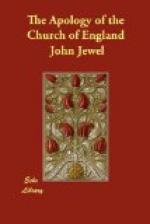Moreover, when the people cometh to the Holy Communion, the Sacrament ought to be given them in both kinds: for so both Christ hath commanded, and the Apostles in every place have ordained, and all the ancient fathers and Catholic bishops have followed the same. And whoso doth contrary to this, he (as Gelasius saith) committeth sacrilege. And therefore we say, that our adversaries at this day, who having violently thrust out, and quite forbidden the Holy Communion, do, without the word of God, without the authority of any ancient council, without any Catholic father, without any example of the primitive Church, yea, and without reason also, defend and maintain their private masses, and the mangling of the Sacraments, and do this not only against the plain express commandment and bidding of Christ, but also against all antiquity, do wickedly therein, and are very Church robbers.
We affirm that bread and wine are holy and heavenly mysteries of the body and blood of Christ, and that by them Christ Himself, being the true bread of eternal life, is so presently given unto us as that by faith we verily receive his body and his blood. Yet say we not this so, as though we thought that the nature and substance of the bread and wine is clearly changed and goeth to nothing: as many have dreamed in these later times, which yet could never agree among themselves, of this their dream. For that was not Christ’s meaning, that the wheaten bread should lay apart his own nature, and receive a certain new divinity: but that he might rather change us, and (to use Theophylact’s words) might transform us into His body. For what can be said more plainly, than that which Ambrose saith: “Bread and wine remain still the same they were before, and yet are changed into another thing:” or, that which Gelasius saith: “The substance of the bread, or the nature of the wine, ceaseth not so to be:” or, that which Theodoret saith: “After the consecration the mystical signs do not cast off their own proper nature; for they remain still on their former substance, form, and kind:” or that which Augustine saith: “That which ye see is the bread and cup, for so our eyes tell us: but that which your faith requireth to be taught, is this: the bread is the body of Christ, and the cup is His blood:” or that which Origen saith: “The bread which is sanctified by the Word of God, as touching the material substance thereof, goeth into the belly, and is cast out into the privy:” or that which Christ Himself said, not only after the blessing of the cup, but after he had ministered the communion: “I will drink no more of this fruit of the vine.” It is well known that the fruit of the vine is wine, and not blood.




